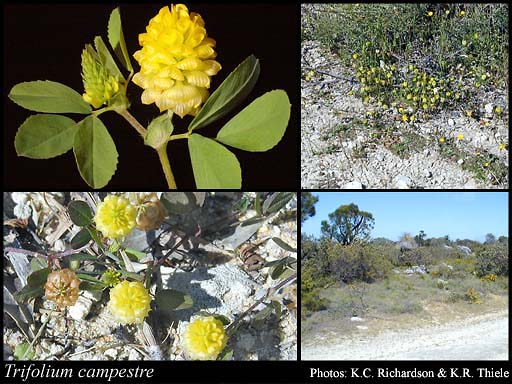- Reference
- Sturm, Deutschl.Fl. 1, Heft 16:13-14 (1804)
- Conservation Code
- Not threatened
- Naturalised Status
- Alien to Western Australia
- Name Status
- Current
Prostrate, ascending or erect annual, herb, 0.03-0.3 m high. Fl. yellow/white, Aug to Dec or Jan. Sandy loams, laterite gravel. Flats. slopes, seasonally damp areas, along creeks,road verges, settled areas.

Distribution
- IBRA Regions
- Avon Wheatbelt, Coolgardie, Esperance Plains, Geraldton Sandplains, Jarrah Forest, Mallee, Pilbara, Swan Coastal Plain, Warren.
- IBRA Subregions
- Chichester, Dandaragan Plateau, Fitzgerald, Geraldton Hills, Katanning, Lesueur Sandplain, Mardabilla, Merredin, Northern Jarrah Forest, Perth, Recherche, Southern Jarrah Forest, Warren, Western Mallee.
- IMCRA Regions
- Central West Coast, Leeuwin-Naturaliste, WA South Coast.
- Local Government Areas (LGAs)
- Albany, Armadale, Augusta Margaret River, Bassendean, Belmont, Beverley, Boyup Brook, Bridgetown-Greenbushes, Broomehill-Tambellup, Bunbury, Busselton, Cambridge, Capel, Chapman Valley, Cockburn, Coorow, Cranbrook, Cuballing, Dandaragan, Denmark, Esperance, Gingin, Gnowangerup, Gosnells, Harvey, Irwin, Jerramungup, Kalamunda, Kent, Kojonup, Kondinin, Lake Grace, Mandurah, Manjimup, Melville, Mundaring, Murray, Narrogin, Nedlands, Northam, Northampton, Perenjori, Perth, Plantagenet, Port Hedland, Quairading, Rockingham, Serpentine-Jarrahdale, South Perth, Stirling, Subiaco, Swan, Victoria Plains, Wagin, Wanneroo, Waroona, West Arthur, Woodanilling, York.
Management Notes (for the Swan NRM Region)
Alternative Names. Low Hop Clover, Field Clover, Large Hop Clover.
General Biology. Growth form. Herb. Life form. Annual. Reproduction. Seed. Dispersal. Agricultural activities.
Notes. Can be biennial. Thrives in temperate regions and does not survive well in dry or hot humid climates. Has low germination rates in unsuitable environmental conditions. Has rapid spring growth. Often found in coarse-textured soils of low fertility. Strong nitrogen fixing ability. Trifolium species capable of high rates of nitrogen fixation may influence the abundance and growth of other plant species.
Additional information. Origin. Mediterranean region. History of use/introduction. Forage, soil improver. Similar exotic species. Trifolium species.
Suggested method of management and control. Spot spray with 1% glyphosate before flowering, alternatively spot spray Lontrel® 3 ml/10 L (150 ml/ha) up to the 6 leaf stage. Read the manufacturers' labels and material safety data sheets before using herbicides. For further information consult the Australian Pesticides and Veterinary Medicines Authority to determine the status of permits for your situation or state.
Management Calendar
| Calendar Type | Jan | Feb | Mar | Apr | May | Jun | Jul | Aug | Sep | Oct | Nov | Dec | Comments |
|---|---|---|---|---|---|---|---|---|---|---|---|---|---|
| Germination | U | U | U | ||||||||||
| Active Growth | Y | Y | Y | Y | Y | Y | |||||||
| Flowering | Y | Y | Y | Y | Y | Y | |||||||
| Fruiting | U | U | U | U | |||||||||
| Optimum Treatment | Y | Y | Y | O |
Legend: Y = Yes, regularly, O = Occasionally, U = Uncertain, referred by others but not confirmed.
References
- Brown, K. & Brooks, K. (2002) Bushland Weeds: A Practical Guide to their Management. Environmental Weeds Action Network, Greenwood.
- Can, E., Celiktas, N., Hatipoglu, R. & Avci, S. (2009) Breaking seed dormancy of some annual Medicago and Trifolium species by different treatments. Turkish Journal of Field Crops, 14 (2): 72-78.
- Hackney, B., Dear, B. & Crocker, G. (2007) Primefact 651 August 2007: Naturalised pasture legumes. NSW Department of Primary Industries URL: http://www.dpi.nsw.gov.au - Accessed May 2010.
- Hussey, B.M.J., Keighery, G.J., Dodd, J., Lloyd, S.G. & Cousens, R.D. (2007) Western Weeds. A guide to the weeds of Western Australia. 2nd Edition. The Plant Protection Society of Western Australia, Victoria Park.
- Texas Invasive Plant & Pest Council (2007) Trifolium campestre, Field clover. URL: http://www.texasinvasives.org/invasives_database/detail.php?symbol=TRCA5 - Accessed May 2010.
- Thomas, B.D. & Bowman, W.D. (1998) Influence of N2-fixing Trifolium on plant species composition in the alpine tundra. Oecologia, 115 (1/2): 26-31.
- Tuttobene, R., Gresta, F., Sortino, O., Frasca Polara, F., Dipasquale, M. & Abbate, V. (2008) Characterization of native populations of Trifolium spp. Options Mediterraneennes, A (79): 395-398.